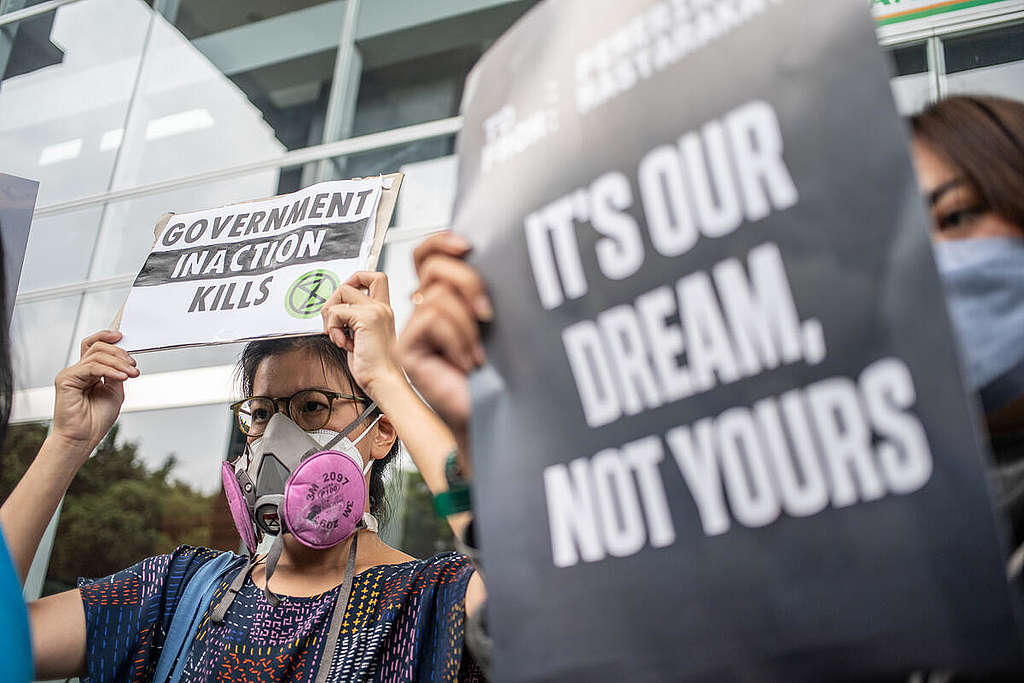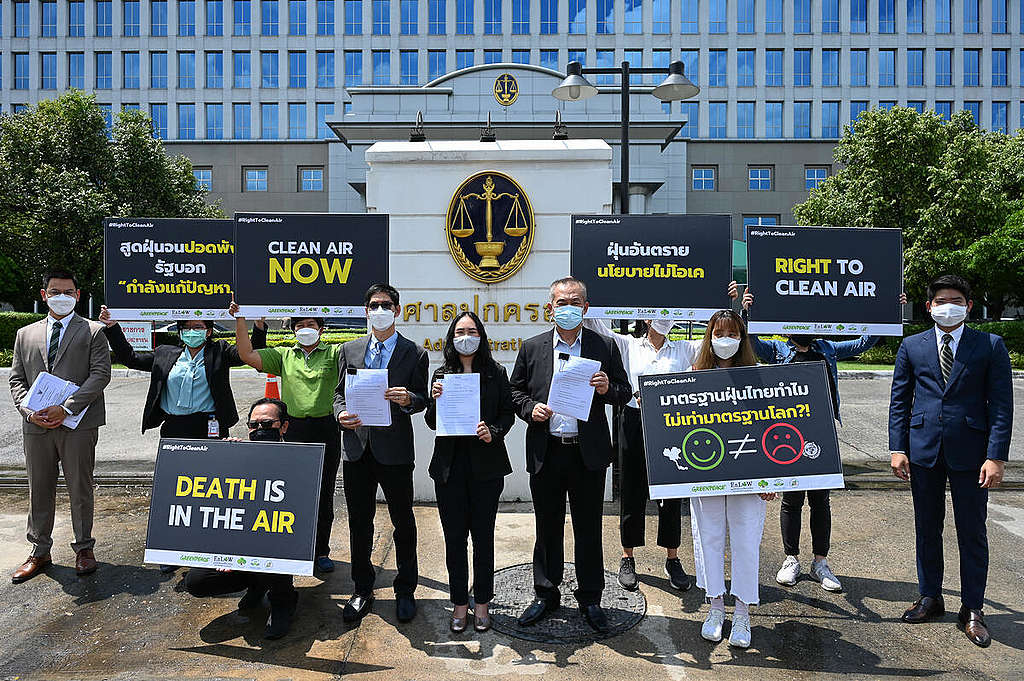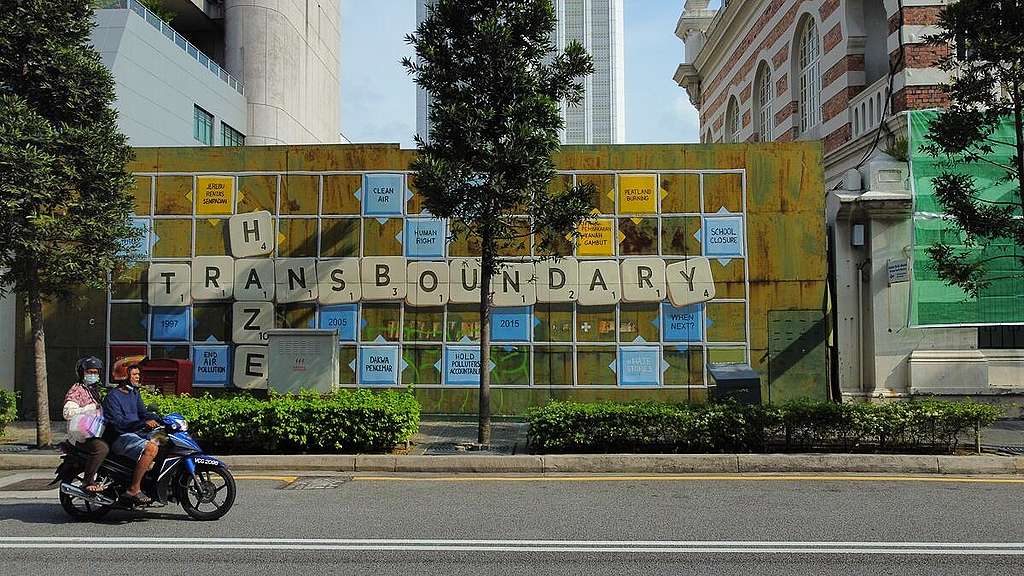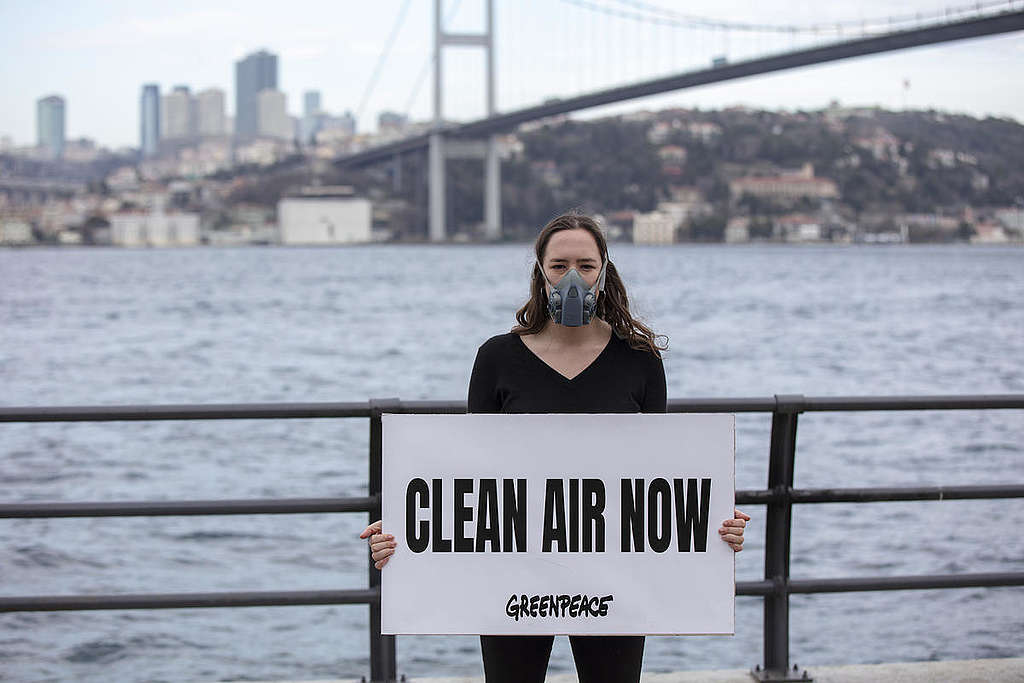Air pollution affects everyone across the globe and is one of the biggest environmental risks for premature death, according to the World Health Organisation (WHO). In 2021, WHO tightened its annual average air quality guidelines. The revised guidelines stipulated the average annual PM2.5 concentration - fine particulate matter smaller than 2.5 millionths of a meter - to not exceed 5 µg/m3, as exposure to even low concentrations of fine particles is linked to significant health risks such as premature death and respiratory-related diseases.
We need governments to develop and enforce strong air quality policies to protect the people's health and the planet. Citizens around the world are coming together to demand clean air and to prompt governments for the implementation of real solutions. Here are some Greenpeace air pollution campaigns, organised by concerned citizens fighting for their right to clean air, and the successes achieved in this long journey in tackling air pollution.
Indonesia

Home to more than 10.5 million people Jakarta, Indonesia is one of the most polluted cities in the world according to the Swiss air quality technology company IQAIR. The main sources of the city's air pollution are emissions from transportation, industrial facilities, and coal-fired power plants in neighbouring provinces and satellite cities.
In 2019, a group of 32 Jakarta residents, including Greenpeace campaigners, filed a lawsuit against the Indonesian President Joko Widodo, three cabinet ministers (Minister of the Environment, Minister of Health, and Minister of Home Affairs), the governor of Jakarta and two provincial leaders due to the government's inaction on air pollution and negligence of health risks. They demanded that Jarkarta's local government and other surrounding regions take serious action to control air pollution, including transboundary air pollution. The lawsuit was not meant to seek compensation from the government but simply to urge the authorities to take more action for clean air.
Since the lawsuit was filed in 2019, the verdict had been postponed eight times over the last two years due to the Covid-19 situation and administrative reasons. But in September 2021, the Central District Court in Jakarta finally ruled that the defendants neglected the citizens' rights to clean air and ordered for monitoring stations and other measures to improve the capital's air quality.
A year has passed since the verdict and the Indonesian government has yet to implement any significant action against air pollution in Jakarta. In January 2022, the 32 citizens involved registered a counter-appeal memorandum with the Jakarta Central District Court as a further legal step against the appeal filed by the four state accused officials.
Thailand

Greenpeace Thailand has been campaigning for many years to increase public awareness on the importance of PM2.5 standards under the #RightToCleanAir campaign. One of their requests was that the government tighten the PM2.5 ambient standard to protect people's lives.
In January 2022, Greenpeace Thailand partnered with the Environmental Law Foundation (EnLaw) to submit a petition letter to the Ministry of Natural Resources and Environment and the Ministry of Industry. While the two ministries responded with their intentions to plan for improving air quality, no specific promises of actions or policies were made to monitor PM2.5.
Two months later, the Civil Society Organizations (CSOs) and environmental advocates filed a lawsuit against three public departments – the National Environment Board, Ministry of Natural Resources and Environment, and the Ministry of Industry – for neglecting their mandate to protect Thai citizens' basic rights to clean air.
In July 2022, the National Environment Council announced a revised ambient air PM2.5 standard to take effect in 2023. The new standard is to reduce the safe amount of PM2.5 dust in the atmosphere from an average 50 micrograms per cubic meter (μg/m3) to 37.5 μg/m3 in any 24 hour period.
This long-awaited victory is due to the team's steadfast advocacy and mastery of social media discussions.
Malaysia

Haze has become a common issue in Malaysia in the last few decades, driven by slash and burn agricultural practices and peat fires both domestically and transboundary. In 2019, Malaysia experienced severe haze pollution, triggering school closures and disrupting air travel. Several Malaysian companies operating in Indonesia have been pinpointed as having played a part in the haze problem.
To address the issues of haze, Greenpeace Malaysia filed a landmark complaint along with CERAH, a civil society movement organization for tackling haze pollution, for the recognition of basic human rights to clean, haze-free air. This prompted a roundtable discussion on the issue by the Human Rights Commission of Malaysia.
In an effort to raise further awareness of the issue, Greenpeace Malaysia collaborated with political artists and activists such as Ernest Zacharevic and Fahmi Reza on a series of art interventions on air pollution around Kuala Lumpur that went viral on social media. To mark the UN's International Day of Clean Air for Blue Skies on 7 September, art duo co2 created an art piece for Greenpeace titled "To Dream of Blue Skies", made from thousands of blue sky photos submitted by concerned citizens around the world.
Turkey

Turkey relies heavily on fossil fuels for energy, as fossil fuel power accounts for 83% of the country's electricity supply, according to the Climate Transparency Report. The country's reliance on coal and its constant investment in new power plants has been an on-going problem and brings more health threats to the local communities, with summer wildfires worsening the problem. According to the Dark Report 2021 published by the 'Right to Clean Air Platform', more than 30,000 people die each year from respiratory illnesses caused by air pollution.
Greenpeace Turkey has been working with local communities to tackle the issues of air pollution. They have cooperated with other 15 NGOs and professional organizations to run the 'Right to Clean Air Platform', worked on an EU-funded health project on climate change and environment "ÇİSİP" and successfully stopped the Turkish Parliament's 2019 Article 45 to initiate a two-year investment in private coal power plants. At the beginning of 2020, after months of hard campaigning from Greenpeace, the government temporarily shut down five coal-fired power plants and the partial unit of one plant.
'The Right to Clean Air Platform Turkey' is now calling on the government to align with the WHO's 2021 new air quality annual average guideline. In 2022, the Ministry of Environment made the draft regulations for the year 2029; the PM2.5 limit value in the draft regulation was aimed to decrease from annual average 30 μg/m3 in 2021 to 25 μg/m3 by 2029, but it is still five to six times higher than the WHO updated guideline.
The empowerment and cooperation of organizations and local residents are the main driving forces to change air quality. In the past two years, the number of signatures for Greenpeace MED's online petition for its clean air campaign has reached as high as 116,000, a show of solidarity and concern for what is happening to our air and to our planet.
These inspiring campaigns proved that citizens and organizations have the power to propel actions from the government when unified. As we all live under one sky, each and everyone of us has the right and ability to change our circumstances to demand for Clean Air NOW.
Joy Chiang is a press officer with the Air Pollution Unit, Greenpeace East Asia.






